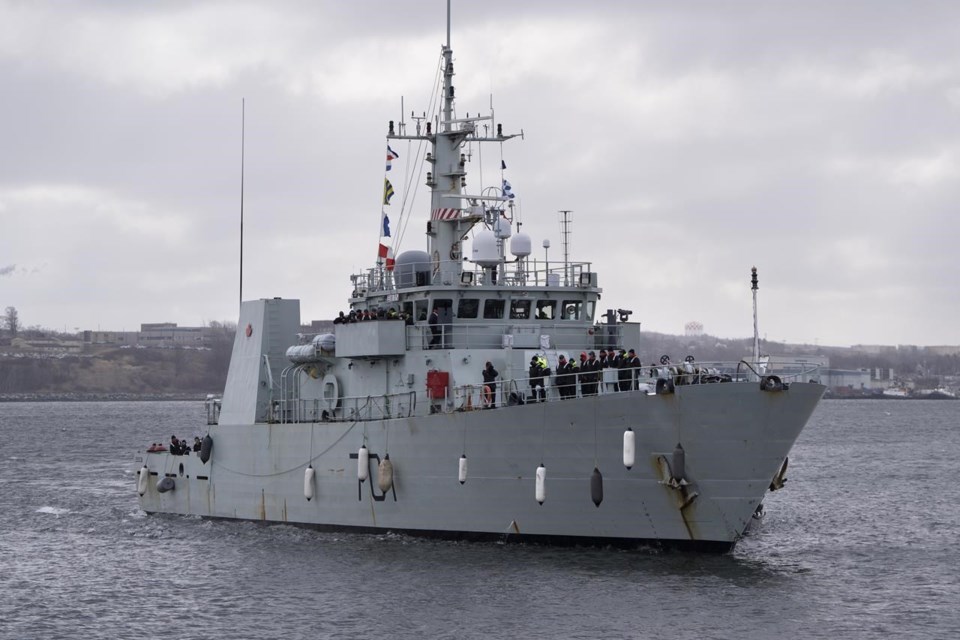HALIFAX — As the search for a missing submersible with five people aboard continued about 700 kilometres south of Newfoundland, two federal cabinet ministers came forward Wednesday to say the Canadian government's focus is on saving lives, not on the cost of the rescue operation.
In Ottawa, the minister responsible for the Canadian Coast Guard, Joyce Murray, said the mounting bills for the United States-led mission were "irrelevant" as long as there was a chance of saving those on the 6.4-metre Titan submersible, which was reported missing Sunday after it set off to explore the wreck of the Titanic.
"We are going to do everything that we can," Murray told reporters. "We have a chance to find this submersible and bring people to the surface .... I think there’s nothing that’s too much. These are human beings and we need to do what we can to save them."
Defence Minister Anita Anand said much the same later when she confirmed the Royal Canadian Navy had dispatched HMCS Glace Bay, a maritime coastal defence vessel, to help with the search.
"At this point, we are doing whatever we can to save lives and that is our most important priority," she told a media briefing.
Aside from the small warship, Canada has also sent a CP-140 Aurora long-range patrol aircraft, which can search below the surface of the water by dropping sonar-equipped buoys that transmit signals back to the plane.
Early on Wednesday, the U.S. Coast Guard issued a statement saying the crew aboard the Aurora had detected some sort of noise underwater, but it was unclear what that indicated. The submersible, operated by U.S.-based OceanGate, is believed to have enough air aboard to last until Thursday morning.
As the search entered its fourth day, critics on social media raised questions about the logic behind committing so many resources to saving members of an elite, high-risk expedition that charged members of the public $250,000 to take part.
"The rescue operation must be costing millions of dollars," said one online commenter who was responding to a Tweet comparing the rescue effort to the many failed bids to save migrants from flimsy ships that continue to founder in the Mediterranean. The United Nations has recorded more than 20,000 deaths and disappearances along the Mediterranean coast since 2014, making it the most dangerous migrant crossing in the world.
"Of course, (the Titan submersible rescue) should happen, but a fraction of that is spent on rescuing, or not rescuing, migrants fleeing persecution," the Twitter post said. "Sadly, such disparities (are) commonplace."
Christopher Boyer, executive director of the U.S.-based National Association for Search and Rescue, said the debate over who should pay for the high-risk operation is complicated by the fact that there is a simple "social contract," or moral imperative, that essentially states: When someone's in need, we want to help.
"People have done stupid things throughout time and yet we've still come to their aid," said Boyer, whose non-profit group oversees advocacy, training, testing and certification for those involved in search and rescue.
"As human beings, we can't just look away from this sort of thing."
Still, Boyer said the issue is worthy of debate.
As a comparison, he said the medical establishment was once committed to saving lives, regardless of individual circumstances. But that changed with the advent of do-not-resuscitate orders.
"It took an act like that to get us to the point where someone could say, 'I don't want heroic measures taken to save me.' And maybe there should be something similar for high-risk activities, where (people say) we don't expect heroic measures to save us if something goes wrong."
Those who try to climb Mount Everest, for example, understand that if their bodies fail near the summit, no one is coming to rescue them, Boyer said. "And we have a similar situation here (in the North Atlantic), where this is such an extreme environment and limited resources."
As a result, Boyer says there should be a discussion about whether different rules should apply when people take part in extreme expeditions, such as commercial space flights.
Meanwhile, the Canadian Coast Guard has committed to sending a small fleet to rescue those aboard the minivan-sized Titan submersible. The offshore science vessel CCGS John Cabot, the heavy icebreaker CCGS Terry Fox and the multitask vessel CCGS Ann Harvey are now part of the rescue team.
"We are continuing to support the United States, which is leading the search and recovery effort," Anand said Wednesday. "Right now, all of the direction and information-gathering to reach … next steps is being led by the United States."
On Tuesday, the United States Coast Guard said a Bahamian research vessel, Deep Energy, had arrived at the submersible's last reported position and that the ship then deployed a remotely operated vehicle. As well, a C-130 Hercules aircraft from the U.S. Air National Guard started searching the area at 5 p.m. ADT.
Canadian commercial ships have also joined the search, including the supply vessel Atlantic Merlin, the anchor handler Horizon Arctic, and the multipurpose offshore vessel Skandi Vinland. The French Research vessel L'Atalante is also part of the search team.
This report by The Canadian Press was first published June 21, 2023.
Michael MacDonald, The Canadian Press



